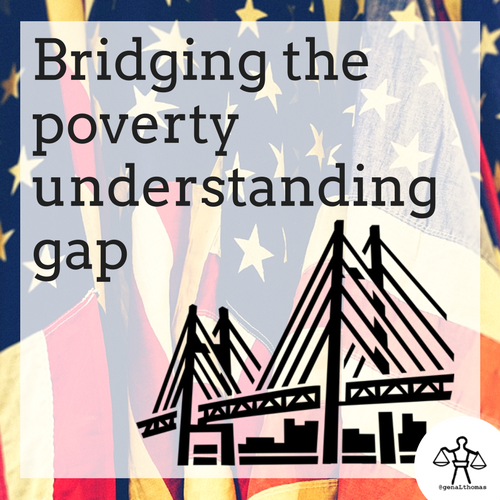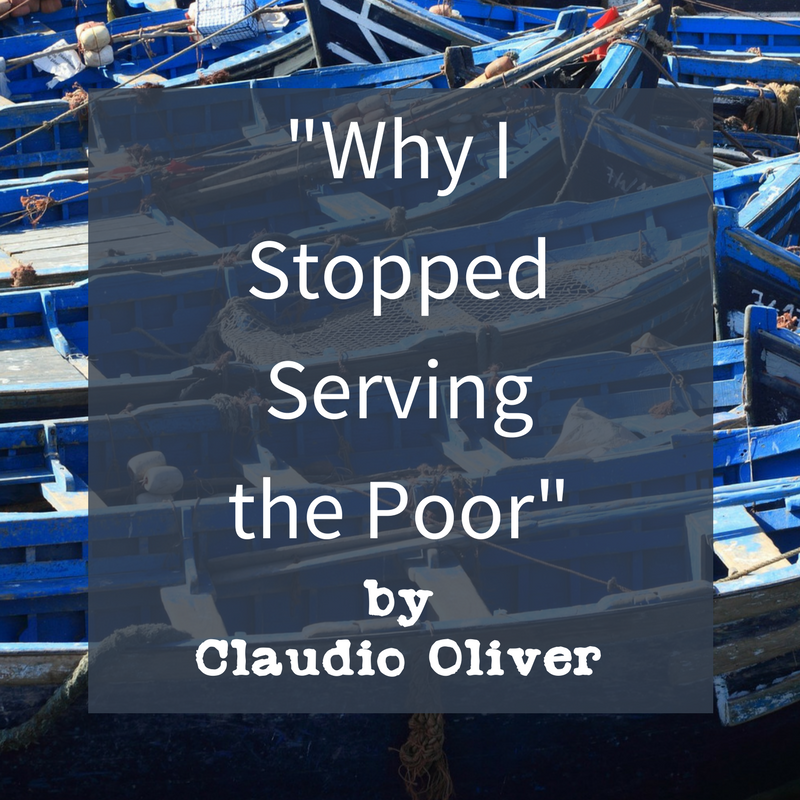 Living below the American poverty line--first as a family of three then continuing as a family of four--has a way of wrecking you. I want to be very clear before I go any further. My family was in the upper echelon of those living on the poverty line for the 2.5 years we were officially on government welfare; and while my experiences are real, they are mine. I do not intend to speak for anyone else who lives or has lived on that line. Please note that while our household income was low, our social support was high, our transportation was private, our housing was a 1800-square-foot house in a quiet lower-middle-class neighborhood; and therefore, our experience was significantly less intense than many others who have low household incomes. I write this with the intent of bridging what seems like an ever-widening divide between my fellow patriots who currently hover around this line or who have hovered on it and remember those days as fully and distinctly as they remember their children's births, and my fellow patriots who have little-to-no understanding of what it is like to walk such a line. This is my attempt to explain how poverty affected me in different areas of life. Our budget was weekly, and we mostly dealt in cash, as it was too easy to go over the budget with plastic. We used an envelope system. We did use credit every once in a while, especially when we were both unemployed and our daughter was freshly born. Every day I thought about money. All the time. There was not a lot of extra pennies and quarters around the house because they would get used. My mouth would sometimes water for fast food like Pavlov's dogs. My heart would long for extras -- extra money that didn't have to go toward an event someone else had planned; extra for a small treat at the grocery store; extra to buy my son the toy he picked up; extra space in my head that wasn't occupied by financial stress; extra for some raspberries that I really wanted to buy; extra so that we could splurge on the meal I was preparing for friends who were coming over; extra so I could give generously rather than stingily; extra so we could pay more than just the minimum on our credit card ... SOCIAL EVENTS -- When friends would ask me (or my husband, or our son) to go out to eat or celebrate a birthday, my mind would tense up with several consistent questions that would put me in a frozen state before I could answer: 1. Will they expect me to pay? 2. How much total will this cost -- food, gas (how far away was the place), birthday gift? 3. Can I find that money in our budget somewhere? Where? Is our electric bill lower than usual? Could I spend $10 less on groceries this week so I can say yes? Which envelope is bigger right now? 4. Will I need to buy a birthday gift? Can I go without bringing a gift? Will they think I'm rude if I do? 5. If I tell them I want to come but can't because of money, will they offer to pay? Will I want them to offer to pay? If I do this too much will they feel I'm a burden? How many times will they offer to pay before they just stop inviting me to come? 6. Will they stop inviting me because I say no all the time? Will our friendship suffer because of it? 7. How much can I let them in on my financial situation without scaring them away? How much truth can I tell them without them feeling burdened to help? 8. Will I be shorting my son a piece of his childhood by not figuring out how to find the money so he can attend his friend's birthday? THE GROCERY STORE -- When I knew I would need to use my WIC vouchers in the grocery store, I would try to eliminate as many stress factors as I could. If family could watch the kids, I'd ask them. If I could do it in the morning when less people were at the store, I'd go then. If I could go to a grocery store that didn't have a lot of traffic, I'd go there. I remember one time using them at WalMart. I only made that mistake once. Not only was the WIC-specific food not marked, it wasn't simply the cheapest brand of peanut butter. So the long line of people behind me at the counter had to wait for the cashier to call someone to go find the right brand of bread. Not only did I inconvenience people, I got to stand there while they huffed, and some made remarks about welfare under their breath; others to my face. I was so glad that Food Lion had the WIC items marked clearly, and so thankful that the employees never seemed to be annoyed at me. They were trained well, understood fully how to insert the voucher into their machines, how to get me to sign, how to charge me more if I went over the $8 allotted for fresh fruit. They always spoke kindly to me, despite the oft-annoyed looks on the faces of the customers behind me. There were times their kind demeanor invoked emotions I would hide until I got to my car. I thank God for people who treated me with dignity, rather than assuming I was a leech on a failing system. FAMILY EVENTS -- From birthday parties to weekend trips to summer vacations, the stress would come, the questions would fill my head: 1. How much will this event cost? How can we make it happen without going into more debt? 2. How long will they pick up our financial slack? How much will they pay this time so we can participate? 3. How much can we splice from our weekly budget to put toward this event? How many weeks between now and then? Calculate. Find money. Short another area of life. Find all the change in the house and the car. Repeat. THE MAILBOX -- My anxiety would often revolve around a trip to my own mailbox. Every time I got a letter from the government to update our Medicaid status, I had, at most, three days to send it back in. I don't know why this happened, but the letter would be dated at least a week before I received it. The office was about a 10-minute drive from our home, but my best guess was that the social worker would write the letter, set the response date from that date, but the letter would not get sent out from the office for a few days. Nonetheless, I had to get our financial records out, sometimes call my husband's employer for missing information to fill out the letter. This always took more than an hour to gather all the information needed, and when I had to wait on responses from others, the stress would pile up. Additionally, during this time, we had gotten a letter from the IRS stating we owed them thousands of dollars because they had a decimal point in the wrong place for our income while we were missionaries in Mexico. No we did not receive $90K that year; we received $9K. This was a long process of mailing them back the correct information and it overlapped our time on government welfare. So the mailbox rarely brought me joy -- and often brought high stress and financial worry. There were literally times I had to pep talk myself into delaying opening an envelope I got from the government until I was in a better place emotionally to handle the contents. VOLUNTEERING -- The majority of our time on welfare, I stayed at home with our two kids, Cade--who hadn't yet started Kindergarten--and Juniper who was born right before Cade turned 4. The price of daycare for one child was a little less per hour than the $10/hr. I made working at a crisis center the first year we moved home. There was no way we could afford daycare for two. As much as I longed to get involved in different areas of church/civic life, it felt nearly impossible to do so. Beyond breastfeeding and barely scraping the money by for Cade to attend preschool three days a week (there was one time in particular we had to take him out of school for financial lack and then a few months later we were able to get him back in preschool because of the sweet donation of a loving couple) - there was little time away from the kids. Again, everything was calculated including daily trips so that gas would be budgeted correctly. I remember one time in the hopes of getting a part-time job, the manager of a Christian nonprofit asked if I could first volunteer my time to see if I would be a good fit. I had no idea how he thought I could manage to do so. In all honesty, I was offended that his framework was so far removed from my own that he couldn't imagine life in my shoes. The reality is, I had a hard time imagining life in his shoes. He probably had no idea of our family's financial situation and simply thought I was an economically-secure middle-class stay-at-home mom. There are many people who are in a life crisis; many who cannot make ends meet without the $500 a month on their EBT card. When hard working people who live and move from a middle-class framework say it's the easy life to live on welfare, I want them to hear my story — because this welfare life is overrated, and I can tell you that it's not one I enjoyed living. I felt guilty, sorry, overwhelmed, overlooked, undignified, like a societal leech, anxious, and worthless more than I felt any form of positive self worth. Please, the next time you think about welfare, remember that. In regards to life in general, I feel as though the gospel compels us to, at the least, imagine life in the other's shoes. Whoever the "other" is to you, let the compassion that Jesus felt for the masses lead you to a better understanding of the other's framework.
6 Comments
|
Gena's
|

 RSS Feed
RSS Feed

